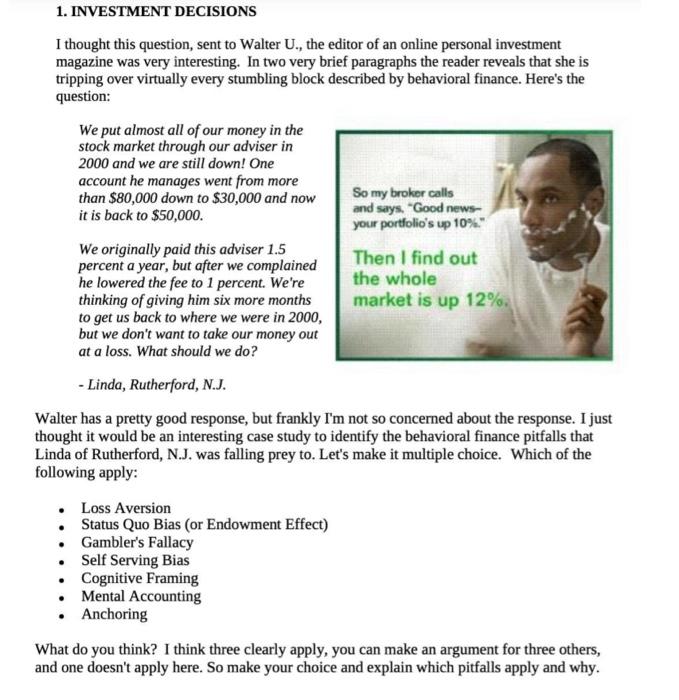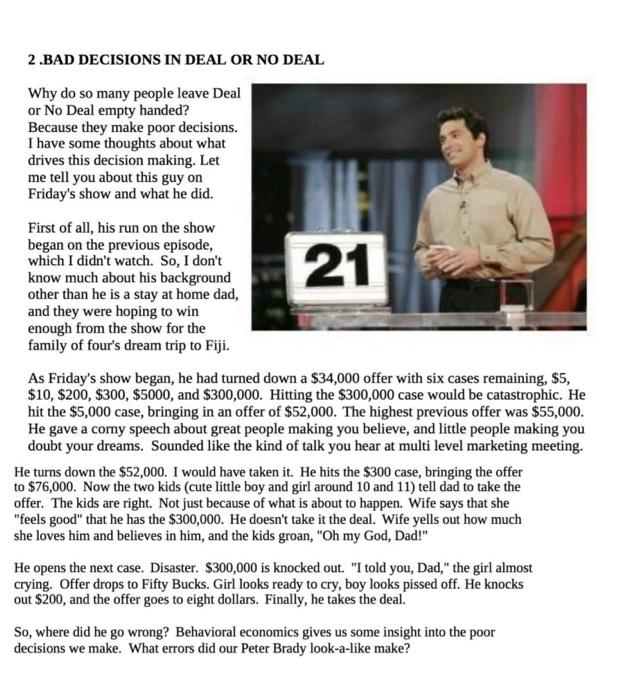Walter has a pretty good response, but frankly I'm not so concerned about the response. I just thought it would be an interesting case study to identify the behavioral finance pitfalls that Linda of Rutherford, N.J. was falling prey to. Let's make it multiple choice. Which of the following apply:
Loss Aversion
Status Quo Bias (or Endowment Effect)
Gambler's Fallacy
Self Serving Bias
Cognitive Framing
Mental Accounting
Anchoring
What do you think? I think three clearly apply, you can make an argument for three others, and one doesn't apply here. So make your choice and explain which pitfalls apply and why.
So, where did he go wrong? Behavioral economics gives us some insight into the poor decisions we make. What errors did our Peter Brady look-a-like make?

1. INVESTMENT DECISIONS I thought this question, sent to Walter U., the editor of an online personal investment magazine was very interesting. In two very brief paragraphs the reader reveals that she is tripping over virtually every stumbling block described by behavioral finance. Here's the question: We put almost all of our money in the stock market through our adviser in 2000 and we are still down! One account he manages went from more than $80,000 down to $30,000 and now it is back to $50,000. We originally paid this adviser 1.5 percent a year, but after we complained he lowered the fee to 1 percent. We're thinking of giving him six more months to get us back to where we were in 2000 , but we don't want to take our money out at a loss. What should we do? - Linda, Rutherford, N.J. Walter has a pretty good response, but frankly I'm not so concerned about the response. I just thought it would be an interesting case study to identify the behavioral finance pitfalls that Linda of Rutherford, N.J. was falling prey to. Let's make it multiple choice. Which of the following apply: - Loss Aversion - Status Quo Bias (or Endowment Effect) - Gambler's Fallacy - Self Serving Bias - Cognitive Framing - Mental Accounting - Anchoring What do you think? I think three clearly apply, you can make an argument for three others, and one doesn't apply here. So make your choice and explain which pitfalls apply and why. Why do so many people leave Deal or No Deal empty handed? Because they make poor decisions. I have some thoughts about what drives this decision making. Let me tell you about this guy on Friday's show and what he did. First of all, his run on the show began on the previous episode, which I didn't watch. So, I don't know much about his background other than he is a stay at home dad, and they were hoping to win enough from the show for the family of four's dream trip to Fiji. As Friday's show began, he had turned down a $34,000 offer with six cases remaining, $5, $10,$200,$300,$5000, and $300,000. Hitting the $300,000 case would be catastrophic. He hit the $5,000 case, bringing in an offer of $52,000. The highest previous offer was $55,000. He gave a comy speech about great people making you believe, and little people making you doubt your dreams. Sounded like the kind of talk you hear at multi level marketing meeting. He turns down the $52,000. I would have taken it. He hits the $300 case, bringing the offer to $76,000. Now the two kids (cute little boy and girl around 10 and 11) tell dad to take the offer. The kids are right. Not just because of what is about to happen. Wife says that she "feels good" that he has the $300,000. He doesn't take it the deal. Wife yells out how much she loves him and believes in him, and the kids groan, "Oh my God, Dad!" He opens the next case. Disaster. $300,000 is knocked out. "I told you, Dad," the girl almost crying. Offer drops to Fifty Bucks. Girl looks ready to cry, boy looks pissed off. He knocks out \$200, and the offer goes to eight dollars. Finally, he takes the deal. So, where did he go wrong? Behavioral economics gives us some insight into the poor decisions we make. What errors did our Peter Brady look-a-like make








